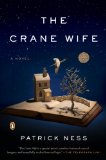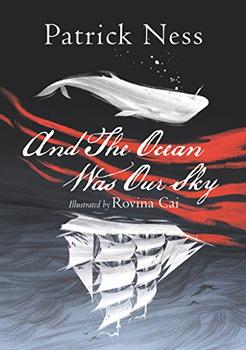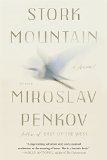Summary | Excerpt | Reviews | Beyond the book | Read-Alikes | Genres & Themes | Author Bio

Readers of young-adult fiction will recognize Patrick Ness as the author of the widely acclaimed Chaos Walking trilogy, as well as the novel A Monster Calls, based on a concept by the late Siobhan Dowd. In these works for young people, Ness has showed himself adept at blending fantastical and real-world elements, including human tragedy (the depiction of terminal illness in A Monster Calls is particularly heartrending). Now, in his first book for adults, The Crane Wife, Ness does the same thing for a new audience (although teen readers will likely enjoy this new work as well). Broadly inspired by a Japanese legend that Ness remembers hearing as a child, The Crane Wife inventively mixes a realistic—even at times funny—love story with spiritual and supernatural elements to create an entirely original work of fiction.
George is forty-eight, American, divorced and living in London, where he runs a printing shop. He's kind of a lovable loser, as he himself is aware, describing himself as "a pleasant enough man, but lacking that certain something, that extra little ingredient to be truly worth investing in." In the opening chapter, George, awakened by what he assumes is his overactive bladder, arises to use the bathroom in the middle of the night but is startled to discover a beautiful crane, having been injured by an arrow, crashing to earth in his back garden. George, recognizing the incident as "one of those moments, only a handful of which he could recall throughout his lifetime, where the world…seemed to pause just for him, so that he could, for a moment, be seized into life." After George saves the crane from its wound, the magnificent bird flies away.
Coincidentally (or is it?) a woman named Kumiko shows up at George's printing shop the very next day. She's looking for advice on how best to print copies of her artwork. Her medium? Bird feathers. George, who also dabbles in artwork, but constructed from book pages, is instantly intrigued: "Every place she may have travelled hadn't wanted her to leave and insinuated itself into her voice as a way of forcing her to take it along." The two of them begin to collaborate both artistically and romantically, and soon their artwork brings them success beyond their wildest dreams. But Kumiko harbors secrets that may signal the inevitable end of their partnership, even if she leaves George far richer than he was before meeting her.
George and Kumiko's love story is interspersed with almost folkloric passages whose relationship to the main narrative, and to Kumiko's life and work in particular, is up to the reader to discern. The spirituality and lyricism of these sections (e.g., "She is born a breath of cloud") contrasts with the realism and humor of the rest of the novel, particularly the exchanges of dialogue between George and his coworker Mehmet. Another significant subplot involves George's grown daughter Amanda, who has romantic problems of her own. Readers familiar with Ness's fantasy works may be primarily surprised at his adeptness with realistic fiction, but Ness's real skill here is in balancing out all these elements, which could have resulted in a confusing mishmash of themes and tones but instead combine in some surprising and satisfying ways. The Crane Wife is an exploration of artistic creation as well as of the creative power of love. It's also a powerful acknowledgment that loss is not always just something to be endured; instead, it can actually enrich our lives and enhance our understanding of what it means to be alive.
![]() This review was originally published in The BookBrowse Review in January 2014, and has been updated for the
January 2015 edition.
Click here to go to this issue.
This review was originally published in The BookBrowse Review in January 2014, and has been updated for the
January 2015 edition.
Click here to go to this issue.

If you liked The Crane Wife, try these:

by Patrick Ness
Published 2018
A richly illustrated and lyrical tale, one that asks harrowing questions about power, loyalty, obsession, and the monsters we make of others.

by Miroslav Penkov
Published 2017
Stork Mountain is an enormously charming, slyly brilliant debut novel from an internationally celebrated writer. It is a novel that will undoubtedly find a home in many readers' hearts.
Your guide toexceptional books
BookBrowse seeks out and recommends the best in contemporary fiction and nonfiction—books that not only engage and entertain but also deepen our understanding of ourselves and the world around us.